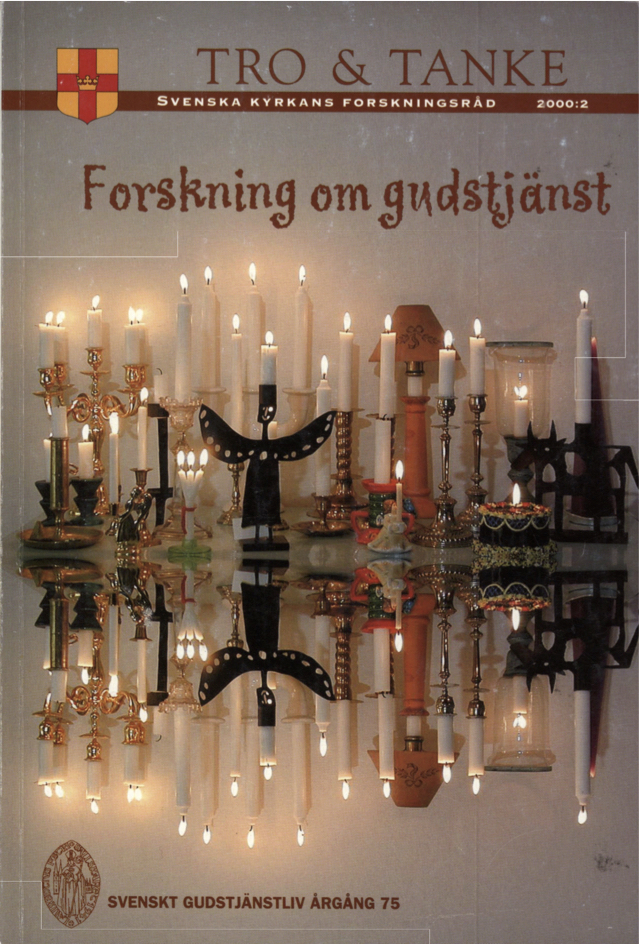Den eukaristiska bönen och svenskt gudstjänstliv
Abstract
The article is a survey of research on, in particular, the position and meaning of the Words of Institution in the liturgy. Some final reflections contrast the result of the survey with the view which is traditional within the Church of Sweden.
Scholars agree that Jewish ritual meals form the point of departure for the eucharistic celebration. The Jewish blessing after the meal was Christianized and transformed into a eucharistic prayer, the most basic element of the eucharistic liturgy of the Church. The Words of Institution—once they had become part of the eucharistic prayer— had the function of defining the authority with which the church celebrates the eucharist, i.e., its institution by Christ. The subsequent part of the eucharistic prayer proceeds from this function: the anamnesis—which is a brief expression of the fact that the Church’s celebration is performed in remembrance of Christ’s suffering and death— leads to the offering of bread and wine, and to the epiclesis, the prayer that Holy Communion will be a participation in the atonement which Christ achieved through his sacrifice.
Lutheran tradition inherited the medieval view that the recitation of the Words of Institution is the sole constitutive element of the eucharistic sacrament. Together with the distribution of communion they were the essential forma sacramenti; that which makes the sacrament a sacrament. This is why there was a definite tendency in the Reformation period to reduce eucharistic liturgies to these two elements alone, most evident in Luther’s Deutsche Messe. Moreover, because the Words of Institution were taken from the Bible, they were thought to retain their quality of divine address: they proclaimed God’s gift of Holy Communion to the celebrating congregation.
The Word of God is, in classical Lutheran theology, not mere speech but an event: the Word performs what it says. For this reason, Lutherans often find it unacceptable to have an epiclesis of consecration before the Words of Institution, since it would transfer the emphasis from the divine action to the human one. A consecratory formula after the Words of Institution is found equally unacceptable, since that would derogate from the consecratory function of the Words of Institution.
I suggest, however, that there exists another and much more serious objection against the epicleses of consecration which have been adopted in the current liturgy of the Church of Sweden. The role which they accord the Holy Spirit is purely instrumental: that which in Lutheran theology is seen as the function of the divine Word now becomes the function of the Holy Spirit, while that which is properly the action of the Spirit is not expressed at all. According to Lutheran theology, the Holy Spirit is transmitted through the Word and the sacraments and, so, brings the grace of God to the believer. The epiclesis of consecration, however, tends to simplify the doctrine of the Spirit and to reduce the third Person of the Trinity to an impersonal force.
We must therefore attempt to clarify the trinitarian structure of the eucharistic prayer. The prayer is directed to the Father in thanksgiving for salvation through Christ. The thanksgiving leads to the Words of Institution through which the sacrament is realized. The subject of thanksgiving becomes a present reality through bread and wine. The concluding part of the eucharistic prayer is where the consequences of the sacrament are described. Here, if anywhere, the role of the Holy Spirit as the One who sanctifies the Church and the lives of the faithful, should be expressed. Much would be gained by this: the eucharistic prayer would get a clearer structure; the classic Lutheran doctrine of the Word would find proper expression in the prayer; and the action of the Spirit would cease to seem impersonally instrumental, being revealed instead as the source of sanctification for Church and individual alike.
Downloads
Published
Issue
Section
License
© the authors, Laurentius Petri Sällskapet för Svenskt Gudstjänstliv and Artos & Norma Bokförlag. Copying and using material from Svenskt Gudstjänstliv for scholarly purposes is permitted as long as the source is indicated. For other uses, please contact the respective author as well as the publisher. Special restrictions may apply to images.


